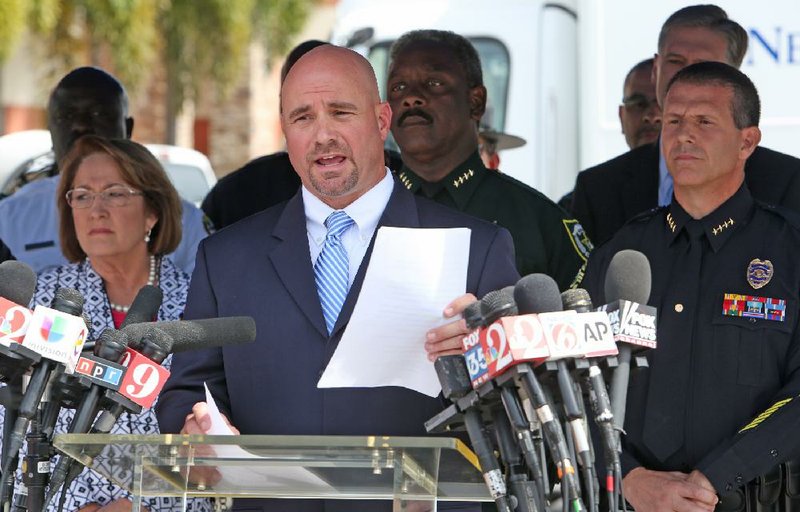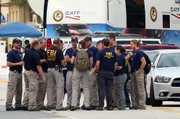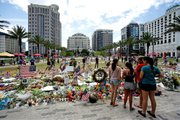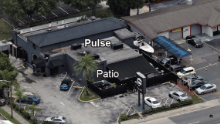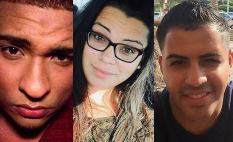WASHINGTON -- Omar Mateen, the gunman in the June 12 massacre in an Orlando, Fla., nightclub, told a crisis negotiator less than an hour after the attack began that the U.S. needed to "stop bombing Syria and Iraq," according to a partial FBI account released Monday.
The original material put out by the FBI omitted any mention of the Islamic State in Mateen's conversations with law enforcement officials. But hours later, the FBI released a fuller transcript of a 911 call after coming under criticism, particularly from Republican leaders who accused President Barack Obama's administration of censoring references to Islamic radicalism.
The FBI continued to withhold parts of later phone calls between the gunman and hostage rescue negotiators during the worst mass shooting in modern U.S. history, in which 49 people were killed and dozens were wounded.
"Praise be to God, and prayers as well as peace be upon the prophet of God. I let you know, I'm in Orlando and I did the shootings," Mateen said in his first 911 call from inside the club, at 2:35 a.m. June 12.
"What's your name?" the call taker asked.
"My name is I pledge of allegiance to Abu Bakr al-Baghdadi of the Islamic State," Mateen said in Arabic, according to the FBI's transcript of that phone call. "May God protect him on behalf of the Islamic State." Al-Baghdadi leads the Islamic State militant group.
In the parts that were released, Mateen warned -- falsely, it turned out -- that there were bombs in a car outside the nightclub and explosives inside the building, and that "you people are gonna get it, and I'm gonna ignite it if they try to do anything stupid." In a series of calls between 2:35 and 3:24 a.m. during a standoff with the police, Mateen claimed responsibility "in the name of God the merciful" and linked the shooting to the terrorist attacks last year in and around Paris.
At a news conference in Orlando, Ronald Hopper, an assistant agent in charge of the FBI's Tampa Division, said the gunman made 911 calls during the shooting in a "chilling, calm and deliberate manner."
Shortly after the call with a 911 operator, Mateen had three conversations with crisis negotiators in which he identified himself as an Islamic soldier and told a negotiator to tell the U.S. to stop bombing Syria and Iraq. He said that was why he was "out here right now," according to the excerpt.
Negotiators spoke to him for a total of 28 minutes over the three calls, the FBI said.
Some of those who were trapped in a restroom with Mateen have described his phone calls previously, and law enforcement officials have noted that he contacted others during the attack. Mateen exchanged text messages with his wife and had at least one phone call with an acquaintance, law enforcement officials have said. The details of that call and those exchanges, though, are unclear, and the FBI has not said how many calls Mateen made or to whom. The transcript seems to leave out what happened during large stretches of time.
The FBI's account of the emergency calls included no mention by Mateen of any hatred of gays or a desire to attack a gay nightclub in particular; the bureau has been investigating the attack as a possible anti-gay hate crime, but the material released Monday offers nothing to back up that theory.
Republicans said agency officials were playing down elements of radical Islamic beliefs in the attack.
"Selectively editing this transcript is preposterous," House Speaker Paul Ryan, R-Wis., said in a statement. "We know the shooter was a radical Islamist extremist inspired by ISIS. We also know he intentionally targeted the LGBT [lesbian, gay, bisexual and transgender] community. The administration should release the full, unredacted transcript so the public is clear-eyed about who did this, and why."
Florida Gov. Rick Scott, a Republican who has frequently criticized Obama's administration, said on Fox News that the limited release "doesn't make any sense to me."
"This is another example of not focusing on the evil here," Scott added.
Hopper said: "Part of the redacting is meant to not give credence to individuals who've done terrorist acts in the past. We're not going to propagate their rhetoric, their violent rhetoric, and we see no value in putting those individuals' names back out there."
FBI timeline
John Mina, Orlando's police chief, addressed a question about whether any of the victims were hit by police bullets in an initial shootout with officers shortly after 2 a.m. Police have said that most of the 49 people killed and 53 wounded were shot in the first minutes of the rampage, before Mateen holed up in a restroom with hostages.
"That's part of the investigation, but here's what I will tell you: Those killings are on the suspect," Mina said.
It was the first time the chief had answered the question in a way that left open the possibility that officers could have killed club patrons by accident.
The medical examiner, Dr. Joshua Stephany, said the autopsies did not determine who killed whom.
A nearly three-hour standoff followed the shootout. The standoff ended when law enforcement agencies stormed the building, killed the gunman and freed the hostages.
The FBI released a timeline Monday that showed a half-hour passed between the time Mateen warned of explosives and the moment when the police stormed the building.
According to the timeline, the first negotiation with the gunman began at 2:48 a.m. and lasted nine minutes. The second call, at 3:03 a.m., lasted 16 minutes; the third, at 3:24 a.m., was three minutes. A SWAT commander said police used the lull to assess the situation and save hostages.
At 4:21 a.m., according to the timeline, police officers pulled an air-conditioning unit out of a dressing room wall to save eight people.
Eight minutes later, some victims relayed that Mateen was threatening to strap bombs to the hostages. About 32 minutes later, the SWAT team and the sheriff's office bomb squad tried to break in. Mina said it took officers time to assemble the explosives to do so.
At 5:14 a.m., officers breached the outer wall as shots were fired. Mateen stuck his head out of the breach and started firing, according to Orlando Mayor Buddy Dyer. Suddenly, Mateen fell backward in a hallway between the two restrooms, Dyer said. At 5:15 a.m., Mateen was reported down.
Mina and other officials defended the handling of the operation from criticism that they waited too long to go in, noting that throughout the lull, officers put themselves at great risk by going into the club to rescue people.
"I think there's this misconception that we didn't do anything for three hours," Mina said. "I'm trying to clarify: That's absolutely not true. Our officers were within the club within minutes, exchanging gunfire with the suspect, forced him to stop shooting and retreat into the bathroom."
"From there, we let our negotiator take over and try to negotiate this to a peaceful resolution in an effort to save lives while our SWAT team set up," Mina said.
Mina said no shots were fired from the time Mateen retreated to the restroom until the police began their assault. People who were trapped in that restroom have said that the killer did shoot a few people after officers began using explosives and an armored vehicle to breach the outer wall of the building.
Dorian Wayne, who was in the club that night, said he thinks police "could have run in and shot" Mateen, but he was sympathetic to the tough decisions law enforcement officials had to make.
"I feel for the people who were in there and didn't get the proper help that they needed," Wayne said. "But at the same time, I understand the cops -- they're human."
Investigation continues
The partial transcript adds another layer of detail to the events of that morning, as FBI counterterrorism investigators and the local authorities in Orlando continue to try to piece together the gunman's motivations and examine whether he received any help.
Attorney General Loretta Lynch will visit Orlando today to meet with the investigators. She said a key goal of the investigation was to determine why Mateen targeted the gay community. The victims were predominantly gay and Hispanic because it was "Latin night" at Pulse.
Investigators continue to believe that Mateen was a "lone wolf" attacker who was apparently inspired by the ideologies of the Islamic State and other terrorist groups but was not directly in contact with any of them.
"We currently have no evidence that he was connected to an Islamic terrorist group, but radicalized domestically," Hopper said at the news conference.
Hopper also said Monday that the tapes of hundreds of 911 calls would not be released out of respect for the victims. City officials have refused to provide hundreds of 911 calls to The Associated Press and other news organizations, citing confidentiality under Florida law and arguing that an ongoing investigation allows the tapes to be kept secret.
"Yes, the audio was compelling, but to expose that now would be excruciatingly painful to exploit them in this way," Hopper said.
The AP and others requested the 911 tapes and related data, a common practice after such major events. The recordings could offer insight into how law enforcement agencies responded.
Information for this article was contributed by Eric Lichtblau, Richard Perez-Pena, Frances Robles and Julie Turkewitz of The New York Times; by Matt Zapotosky, Mark Berman, Abigail Hauslohner and Arelis Hernandez of The Washington Post; and by Eric Tucker, Mike Schneider, Alex Sanz, Jack Gillum and Sadie Gurman of The Associated Press.
A Section on 06/21/2016
